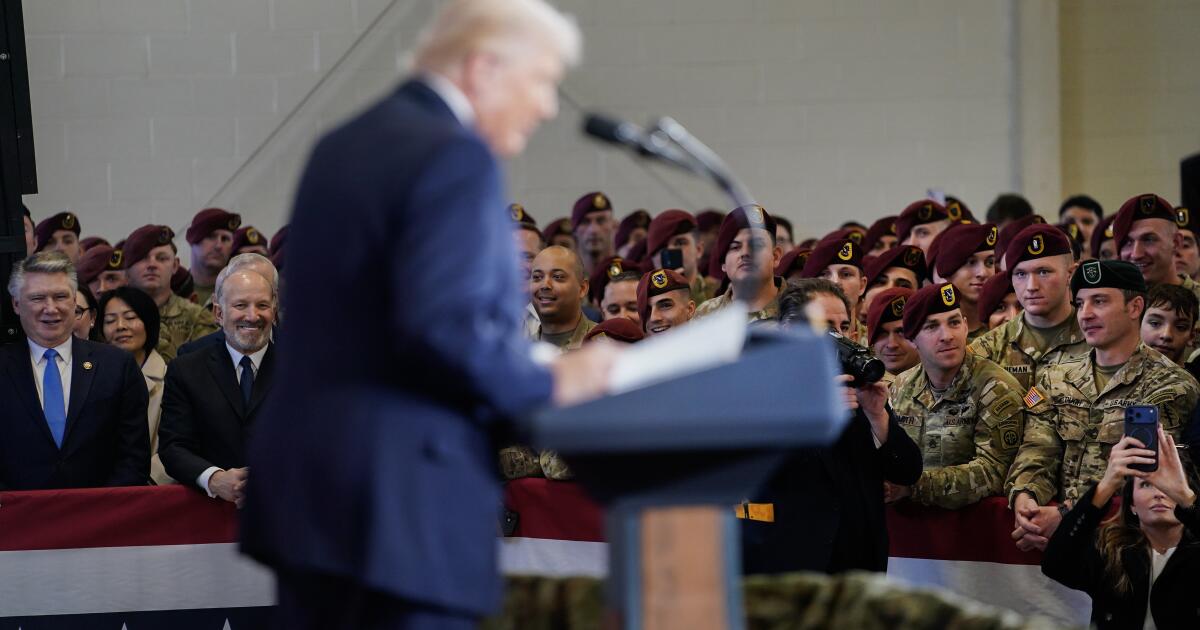Column: Clinton, Bush, Obama and Biden, please speak out against Trump
Where are the statesmen when the state is under siege by the current head of state?
I’ve been mulling that question, hardly for the first time, but on three occasions just in the last few days.
On Monday, the federal holiday celebrating George Washington’s birth, former President George W. Bush posted an essay on the first U.S. president as part of a civic project commemorating the nation’s 250th year. Simply by hailing Washington for traits that Donald Trump utterly lacks — humility, integrity, dignity, self-restraint, willingness to forfeit power — the piece was widely read as a sneak attack on the current president. Bush never named Trump. He thus maintained his years-long, stupefying silence about the man who’s trashed him, his family, his party, his legacy PEPFAR program and, most of all, his country.
As Jonathan V. Last wrote for the right-of-center, anti-Trump Bulwark, if Bush’s words were a veiled attack on Trump, “the veil is so powerful that even light can’t escape it.”
Bush’s essay came two days after former President Obama finally responded to Trump’s week-old racist post that caricatured the first Black president and his wife as apes, thereby mainlining into the body politic one of the most toxic tropes against Black Americans. Asked about it in a podcast interview, Obama was, as usual, too cool. He called Trump’s behavior “deeply troubling” and said “there doesn’t seem to be any shame about this among people who used to feel like you had to have some sort of decorum and a sense of propriety and respect for the office.”
But, like Bush, he never named Trump. And it’s not even clear that Obama was referring to him. Certainly Trump never was one of those who, as Obama put it, “used to feel … some sort of decorum and a sense of propriety and respect for the office.”
Then there was the third trigger for my musings about America’s M.I.A. statesmen.
On Friday — ahead of the holiday honoring Washington, who as the first president and military commander established the indispensable tradition of a nonpartisan military — Trump yet again violated Washington’s precedent. At Ft. Bragg in North Carolina, he essentially pushed uniformed young troops to violate the military codes enshrining Washington’s legacy of nonpartisanship. Trump treated them like props at a MAGA rally, lauding Republican candidates and officeholders on hand, mocking past presidents and urging the troops to vote Republican in November.
“You have to vote for us,” the commander in chief ordered them.
This is unprecedented, except by Trump himself. In October, he prodded sailors at Norfolk, Va., to boo “Barack Hussein Obama.” In September, he told commanders summoned from around the world that the fight is here at home, a “war from within” American cities. In June, also at Ft. Bragg, Trump damned Democrats and sold MAGA merch, over Army objections.
There’s a darn good reason for the wall that Washington built between the military and civilian government. As the Army Field Manual instructs troops: “Nonpartisanship assures the public that our Army will always serve the Constitution and our people loyally and responsively.” Not just Republicans, and not just Trump.
But as multiple officers told the website Military.com, “holding troops to account when goaded by the president, who is ultimately the boss, would be impossible.” Commanders themselves are mute because, after all, Trump is the commander in chief. They’ve watched as one Pentagon purge has followed another, starting with Trump firing the chair of the Joint Chiefs of Staff, the nation’s top military officer. He chose instead an officer who, he often claims, once donned a MAGA cap and said, “I love you, sir. … I’ll kill for you, sir.”
It’s understandable that active-duty officers don’t make a stand. But what about America’s roughly 7,500 retired generals and admirals? As veteran ML Cavanaugh wrote in the Los Angeles Times after Trump’s Ft. Bragg performance last year, “The military profession’s nonpartisan ethic is at a breaking point.” Sure, individuals have spoken out. But as the military knows better than anyone, there’s strength in numbers.
It’s past time for a large, united front of veteran commanders to challenge Trump. Why wait for him to make good on his talk of invoking the Insurrection Act to deploy troops at the polls in this midterm election year, based on trumped-up conspiracies about Democrats’ fraud?
You know who could give the veteran and active commanders some political cover? The former commanders in chief.
Even more conspicuous than the brass by their silence and virtual invisibility in the face of Trump’s assaults — on the rule of law, civil rights, elections, foreign alliances and America’s global reputation — are the nation’s four living former presidents: Democrats Joe Biden, Obama and Bill Clinton, and Republican Bush.
It’s past time for the not-so-fab four to come together to publicly demand that Trump honor the oath of office that each man took, and to school the electorate on the many ways in which he’s dishonoring it — including by continuing to justify his refusal to peacefully transfer power in 2021. But each man is so observant of the norm that former presidents should not publicly criticize the incumbent one — again, a precedent from George Washington — that they self-muzzle.
This is Americans’ quandary in these Trump times: Presidents and high-ranking veterans who could speak truth to power are so constrained by their devotion to norms and traditions that they won’t confront a president who’s daily shattering the norms, traditions and laws that form the foundation of this democratic nation.
“This is the master alarm flashing for our democracy,” Sen. Mark Kelly, an Arizona Democrat and veteran, said last week of Trump’s targeting of him and other critics.
That takes us back to my original question: Where are the statesmen to answer that alarm?
Answer: They’re following ordinary rules despite these extraordinary times. And they must stop.
Bluesky: @jackiecalmes
Threads: @jkcalmes
X: @jackiekcalmes
